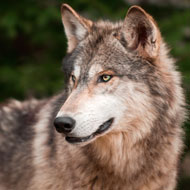Dogs domesticated twice, new study suggests

Findings show that dogs were first domesticated from geographically separated wolf populations on opposite sides of the Eurasian content.
Domestic dogs emerged from two separate wolf populations in different parts of the world, according to new research.
A study published in the journal Science, demonstrates a genetic split between modern dogs living in east Asia and those in Europe.
The discovery means that dogs may have been domesticated not once, as widely believed, but twice.
In the study, researchers reconstructed the evolutionary history of dogs by first sequencing the genome of a 4,800 year old dog from bone excavated in Ireland.
The team also obtained DNA from 59 ancient dogs living between 14,000 to 3,000 years ago. They then compared this with the genetic signatures of over 2,500 previously studied modern dogs.
Their findings show that dogs were first domesticated from geographically separated wolf populations on opposite sides of the Eurasian content.
“Animal domestication is a rare thing and a lot of evidence is required to overturn the assumption that it happened just once in any species,” commented Professor Greger Larson, senior author and Director of Paleo-BARN at Oxford University.
“Our ancient DNA evidence, combined with the archaeological record of early dogs, suggests that we need to reconsider the number of times dogs were domesticated independently.”
Co-author Professor Keith Dobney from the University of Liverpool’s Department of Archeology added: “With the generous collaboration of many colleagues from across the world–sharing ideas, key specimens and their own data – the genetic and archaeological evidence are now beginning to tell a new coherent story.
“With so much new and exciting data to come, we will finally be able to uncover the true history of man’s best friend.”
Research will continue to establish the exact timing and locations of the origins of the world’s oldest pet.



 The Animal and Plant Health Agency (APHA) has updated its online reporting service for dead wild birds.
The Animal and Plant Health Agency (APHA) has updated its online reporting service for dead wild birds.